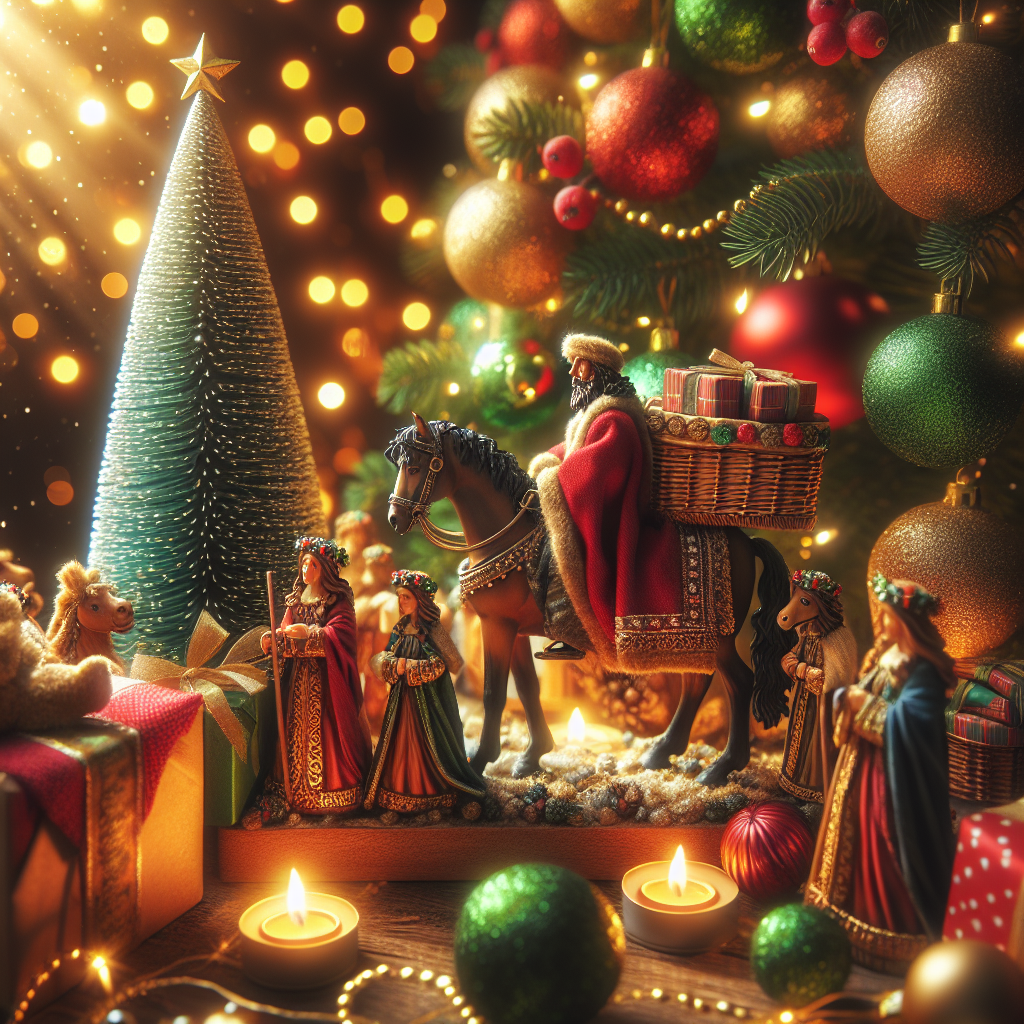Imagine the excitement that fills the air as Christmas draws near, the joyful anticipation of exchanging gifts, gathering with loved ones, and indulging in scrumptious feasts. But have you ever wondered why we celebrate Christmas for not just one, two, or even seven days, but a full eight days? This intriguing article seeks to unravel the mystery behind the length of the Christmas celebration and delve into its significance. From ancient traditions to religious observances, discover the enchanting reasons that make Christmas an eight-day affair.
Table of Contents
The Origins of Christmas
The Birth of Jesus
Christmas, as we know it today, finds its origins in the birth of Jesus Christ. According to Christian beliefs, Jesus was born on the 25th of December in Bethlehem. This event marks the central theme of Christmas, as it celebrates the arrival of the Savior and the hope he brings to humanity.
Earliest Celebrations of Christmas
Although the exact date of Jesus’ birth remains uncertain, early Christians began celebrating Christmas as early as the 4th century. These celebrations initially took place primarily in the Eastern part of the Roman Empire. The celebration of Christmas gradually spread across different regions and became an integral part of Christian tradition.
Adoption by the Roman Empire
The Roman Empire played a vital role in the adoption and spread of Christmas celebrations. In the 4th century, Emperor Constantine officially recognized Christianity, and with it, the celebration of Christmas. As Christianity became the dominant religion in the Roman Empire, Christmas began to emerge as a significant holiday, celebrated not only by Christians but also by various other cultural and ethnic groups.
Christian Tradition
The Octave of Christmas
One unique aspect of the Christmas celebration in Christianity is the tradition of the Octave of Christmas. The Octave refers to the eight-day period immediately following Christmas Day. During this time, each day is treated as a continuation of Christmas itself, representing an extended period of rejoicing and reflecting on the significance of Jesus’ birth.
Symbolism of the Number 8
The number 8 holds great symbolic significance in Christianity. It signifies new beginnings and eternal life, as Jesus was believed to have risen from the dead on the eighth day, which is also referred to as the “Lord’s Day.” Therefore, the eight-day celebration of Christmas reflects the importance of Jesus’ birth as the beginning of a new era and the promise of everlasting life.
Liturgical Celebrations
Within Christian communities, Christmas is celebrated through various liturgical practices. Special church services, such as Midnight Mass, are held on Christmas Eve, where believers gather to commemorate the birth of Jesus and offer prayers of gratitude. The liturgical traditions associated with Christmas further highlight the religious significance and deep-rooted faith of Christians during this festive season.

Jewish Influences
The Importance of the Number 8 in Jewish Tradition
The number 8 also holds significance in Jewish tradition. In Judaism, the eighth day of a particular event or ceremony often symbolizes completion, renewal, and dedication. For example, male infants are circumcised on the eighth day after birth, signifying their inclusion in the covenant between God and the Jewish people.
Relation to Hanukkah
The Jewish holiday of Hanukkah, also known as the Festival of Lights, is celebrated for eight days. It commemorates the rededication of the Second Temple in Jerusalem and the miracle of the oil. The shared duration of eight days between Hanukkah and the Octave of Christmas demonstrates the historical and cultural influences between Judaism and Christianity.
Advent Season
Countdown to Christmas
The Advent season marks the beginning of the Christian liturgical year and serves as a time of preparation and anticipation for the arrival of Jesus. Advent typically starts on the fourth Sunday before Christmas and lasts for four weeks.
Four Sundays of Advent
Each Sunday during Advent, Christians light a candle on an Advent wreath, symbolizing the four themes of hope, peace, joy, and love. This practice allows believers to reflect on the teachings of Jesus and the values he represents, fostering a sense of spiritual readiness for the celebration of Christmas.

Epiphany
The Tradition of Twelve Days of Christmas
The tradition of the Twelve Days of Christmas begins on Christmas Day and ends on the eve of Epiphany, which is January 5th or 6th depending on the tradition. These twelve days are meant to commemorate various events from the birth of Jesus to the visit of the Magi, also known as the Three Wise Men.
Epiphany as the End of the Christmas Season
Epiphany, also known as the Feast of Theophany, marks the end of the Christmas season in many Christian traditions. It celebrates the revelation of Jesus as the Son of God and his manifestation to the world. Epiphany also holds religious significance in different cultural and ethnic communities, often accompanied by unique customs and traditions.
Different Calendars
Julian Calendar
Before the adoption of the Gregorian calendar, the Julian calendar was widely used. It was introduced by Julius Caesar and had a different calculation for leap years. Consequently, Christmas was celebrated on different days in various regions depending on the calendar in use, leading to variations in the observance of the holiday.
Gregorian Calendar
The Gregorian calendar, introduced by Pope Gregory XIII in 1582, aimed to bring the celebration dates into alignment with the solar year. Countries gradually adopted this calendar, resulting in a shift in Christmas celebrations from the earlier dates dictated by the Julian calendar.
Shift in Celebratory Dates
The transition from the Julian to the Gregorian calendar caused a ten-day discrepancy. As a result, many countries had to adjust their celebrations, causing Christmas Day to be celebrated on different dates. These changes highlight the influence that calendars hold over our cultural and religious practices.

Secularism vs. Religion
The Commercialization of Christmas
As Christmas gained popularity and became widely celebrated, it also became subject to commercialization. Many argue that the true meaning of Christmas has been overshadowed by consumerism and materialistic trends. The emphasis on gift-giving and holiday shopping often distracts from the religious significance that Christmas holds for Christians.
Religious Significance vs. Materialistic Interpretation
While the commercial aspects of Christmas have undoubtedly become prominent, its religious significance remains important to many. For believers, Christmas goes beyond the exchanging of presents and embraces the deep sense of joy, hope, and love associated with the birth of Jesus. Balancing the secular and religious aspects of Christmas is a personal journey for each individual.
Regional Traditions
Nordic Countries
In Nordic countries such as Sweden and Norway, Christmas traditions often involve the concept of “Jul.” These celebrations include the lighting of Advent candles, the display of Julbocks (Yule goats), and the presence of the “Tomte” or “Nisse,” a mythical creature associated with Christmas folklore. These traditions reflect the cultural heritage and unique customs of the Nordic regions.
Eastern Orthodox Churches
In Eastern Orthodox churches, the celebration of Christmas follows the Julian calendar. This means that Christmas is observed on January 7th in countries such as Russia, Greece, and Serbia. The Orthodox Christmas traditions incorporate liturgical services, fasting periods, and the exchange of greetings, maintaining a strong adherence to religious customs.
Latin American Celebrations
Latin American countries have their own distinct Christmas traditions influenced by the region’s rich cultural diversity. Christmas in Mexico, for example, involves the Posadas, a reenactment of Mary and Joseph’s search for shelter. In Brazil, the celebration of Christmas often includes vibrant street parades and firework displays. These regional traditions demonstrate how Christmas has evolved and adapted to local cultures around the world.

Cultural Adaptations
Influence of Pagan Festivals
Christmas celebrations have incorporated elements from pre-Christian pagan festivals. For example, the use of evergreen trees, wreaths, and holly during the holiday season stems from ancient traditions that revered nature and the winter solstice. As Christianity spread, it assimilated local customs and transformed them into symbols of hope and everlasting life.
Assimilation of Local Customs
Throughout history, Christmas has assimilated numerous local customs, making it a truly global holiday. From the inclusion of nativity scenes to the creation of unique holiday dishes, each culture has contributed its own flavor to the Christmas celebration. This assimilation demonstrates the power of Christmas as a unifying force, transcending cultural and religious boundaries.
Evolution of Christmas
Historical Changes in Celebration Length
Over time, the duration of Christmas celebrations has undergone various changes. From initially being a one-day celebration, Christmas extended to twelve days during the Middle Ages and eventually settled into the traditional eight-day Octave. Additionally, the adoption of Advent and the Twelve Days of Christmas further expanded the festivities surrounding Jesus’ birth.
Interpretations and Adaptations Over Time
As Christmas has evolved, different interpretations and adaptations have arisen. From the spiritual focus of religious ceremonies to secular interpretations focused on gift-giving and Santa Claus, Christmas holds diverse meanings for different people. This evolution allows individuals to celebrate Christmas according to their own beliefs, traditions, and cultural backgrounds, making it a deeply personal and universally cherished holiday.
In conclusion, Christmas is a holiday with deep historical and religious roots. Its origins lie in the birth of Jesus Christ and have been shaped by the traditions, beliefs, and cultural practices of various regions and communities. While the world has seen changes in how Christmas is celebrated and perceived, the core message of hope, love, and the birth of a Savior remains at the heart of this festive season. From the Octave of Christmas to the influence of pagan festivals and the assimilation of local customs, Christmas truly is a holiday that has evolved and adapted over time. Whether celebrated in a religious or secular manner, Christmas continues to bring people together, fostering joy, togetherness, and a sense of renewal as the world embraces the holiday season.


